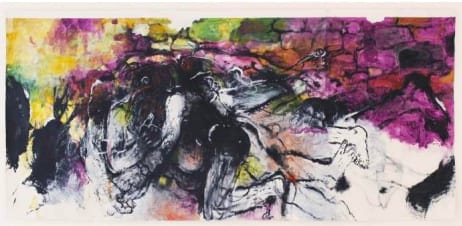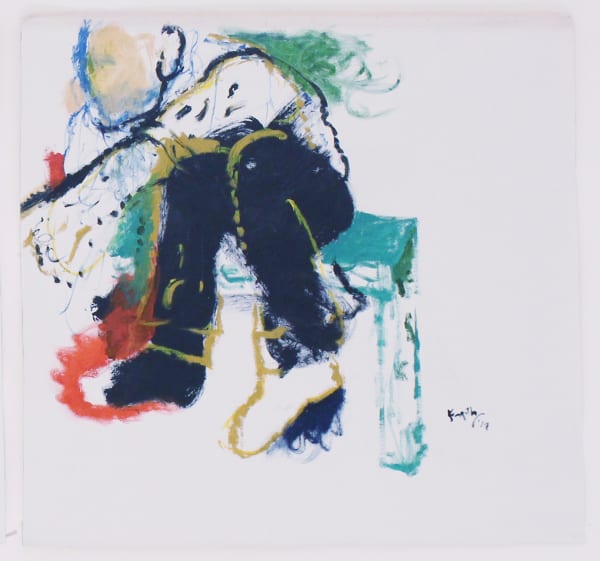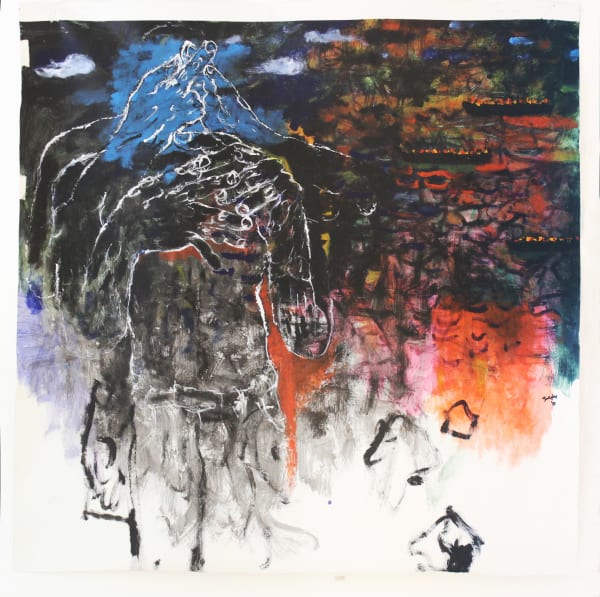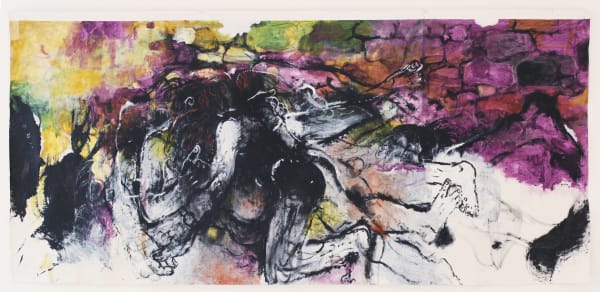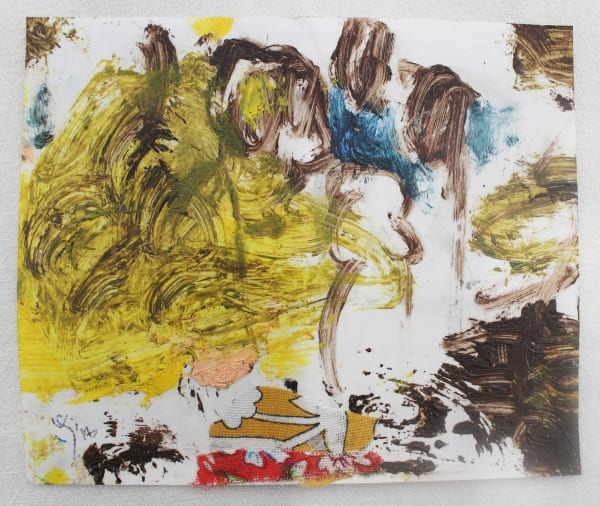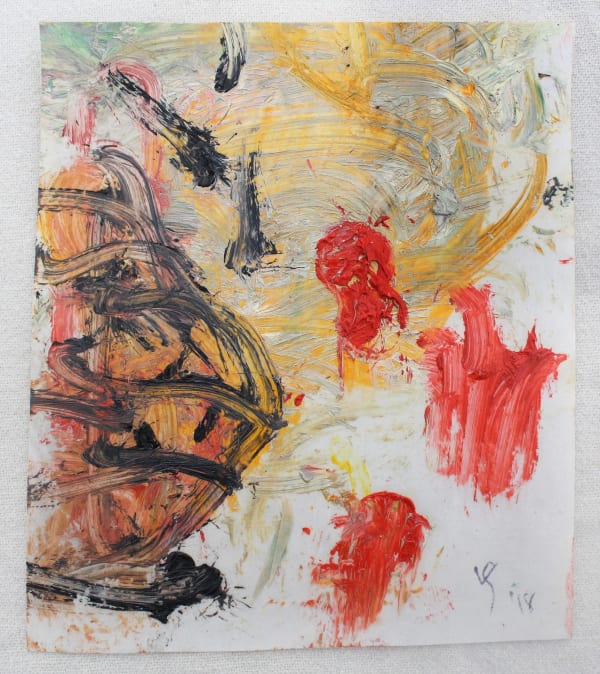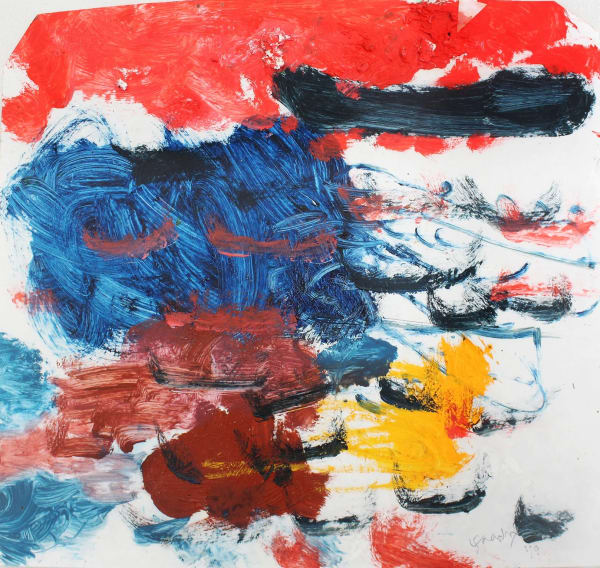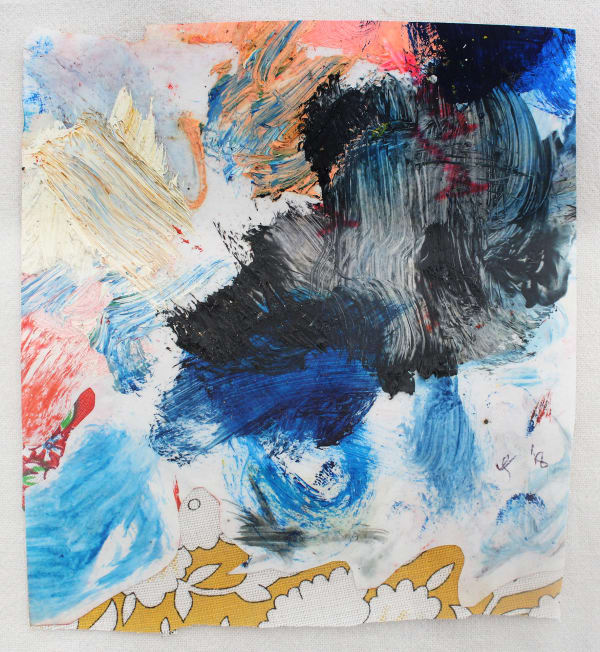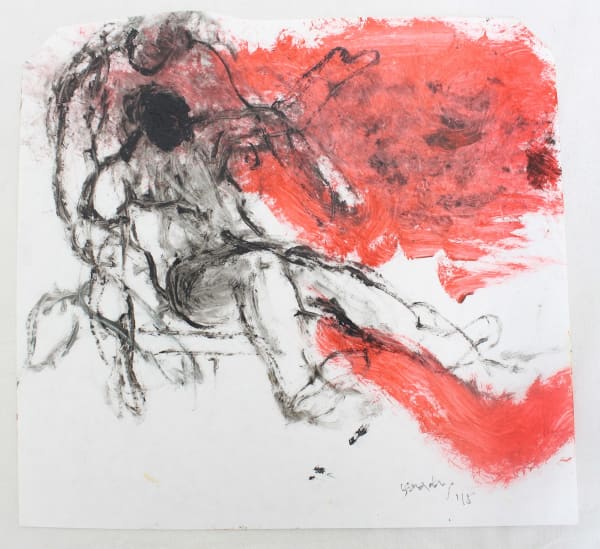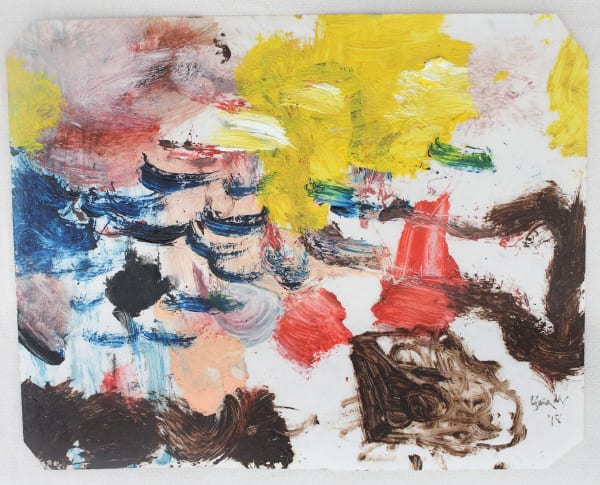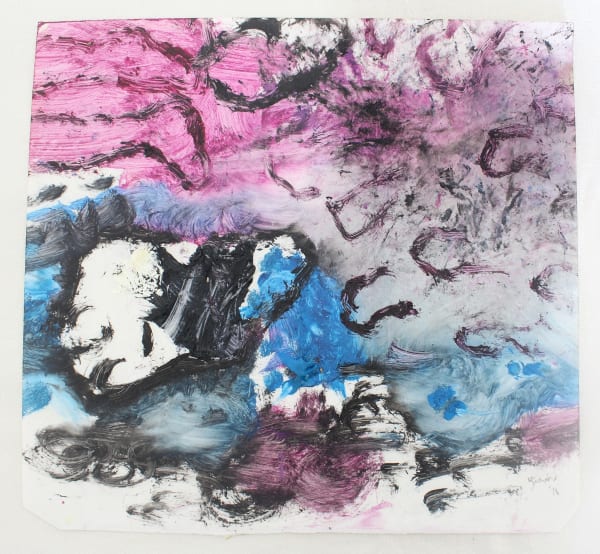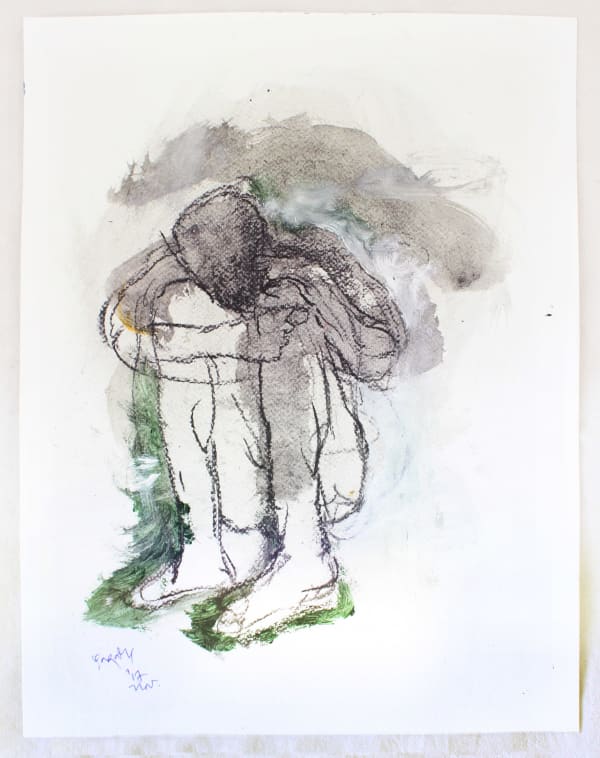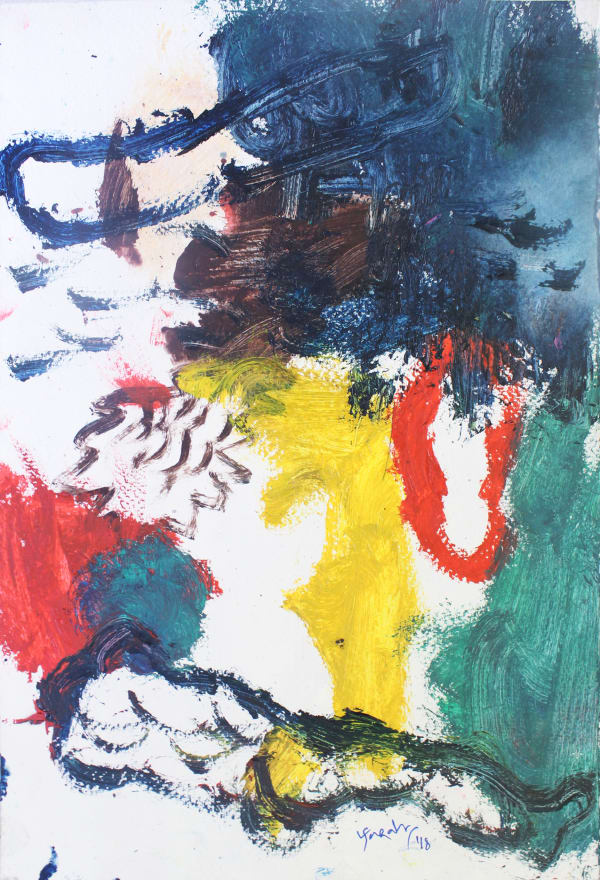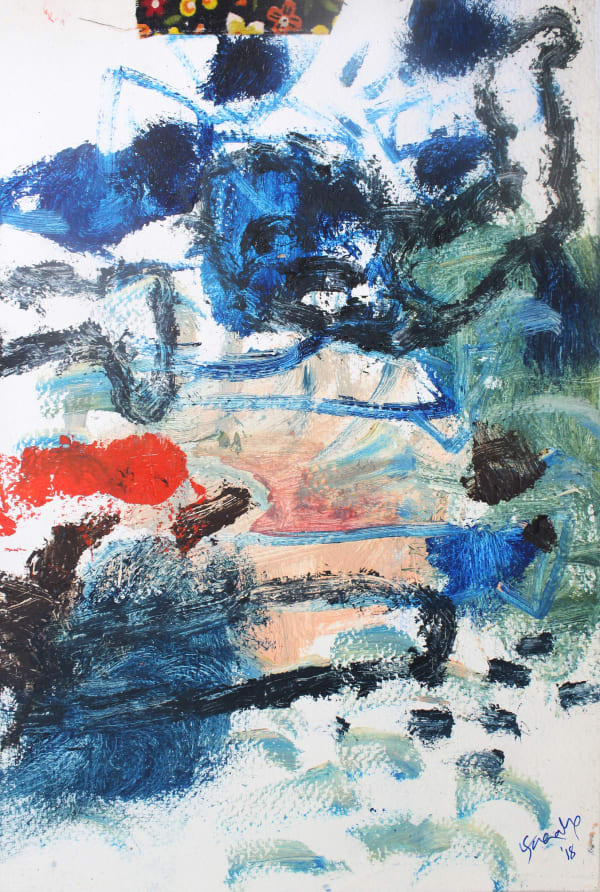Belief: The Promise of Absence: Jagath Weerasinghe
The works in this show, as usual, are about social calamities and personal pains. Currently the world is experiencing a major civilizational crisis played out as mass migration - millions of people are forced to leave behind their “lives” and “memories”. These works are trying to take an intimate engagement with the suffering - ontological anxieties - of the individual caught in a crisis that is global and local at the same time. For everyone that has ‘left a place’, there are so many others who are ‘left behind’.
‘Were we always blind?’
‘I heard it like a whisper. It was clear and there was a reflexive pause between the word ‘we’ and ‘were’. You uttered this like a pronouncement, though it’s a question. The ‘d’ sound of the blind made a weighty ending to the whisper. I stood up pushing the chair back - the old heavy chair gave an uneasy creaky sound that pierced the unsettling silence in the room that emerged after the whisper, and the dormant memories in the chair - to walk across the room to you, for I felt like I wasn’t sure if I heard you correct, but I knew I heard you so clearly - why is it that clarity of something alone doesn’t amount to knowledge of that something? What was it that we didn’t see? What is it that we are not seeing now? What is the truth in your utterance? I asked myself - as I walked across the room. What you uttered didn’t allow me to be outside of what you said - because you said ‘us’, and that unnerved me. I felt like I have been uttering it all the time. There was reluctance in my steps, I felt like my feet were making some lazy moves - that almost made my walk to your corner of the room - that very naming of the place you sat as your corner, took me by surprise, since when, I asked myself, I saw as if you were having your own corner in our room - made me miss a step as I walked towards you - I almost tripped – it was like a beginning of a long distance race, a journey to some where I have never been before. Our room was well lit, but a strange shadow had fallen across the cement floor - the shadow reminded me of the crying little bird I rescued in a rainy morning from under a tree from a group of vicious crows, long time ago. The softness of the bird’s fragile wet body felt on my fingertips as a real thing at that moment as I walked dragging my feet across the floor - our floor always looked dirty, there wasn’t much we could do about that, except arguing about cleaning it and redoing it someday. That someday didn’t come, but we lived pretending an anticipation for a clean floor. The shadow brought a twist to my gait - to my movement to you - my lover for decades. The first two steps brought me to the shadow, and a second later I found myself sitting back on my chair. I didn’t finish the very short distance in the room that separated me from you. You whispered again, ‘were we always blind?’
Jagath Weerasinghe 2018
-
 Jagath WeerasingheBELIEF 15, 2018Mixed Media on Paper40 x 30 cm
Jagath WeerasingheBELIEF 15, 2018Mixed Media on Paper40 x 30 cm
15 3/4 x 11 3/4 in -
 Jagath Weerasinghe, BELIEF XVII, 2018
Jagath Weerasinghe, BELIEF XVII, 2018 -
 Jagath WeerasingheBELIEF XII, 2018Acrylic on Canvas137cm x 138cm
Jagath WeerasingheBELIEF XII, 2018Acrylic on Canvas137cm x 138cm -
 Jagath Weerasinghe, BELIEF XIII, 2018
Jagath Weerasinghe, BELIEF XIII, 2018
-
 Jagath Weerasinghe, BELIEF VI, 2018
Jagath Weerasinghe, BELIEF VI, 2018 -
 Jagath Weerasinghe, BELIEF IV, 2018
Jagath Weerasinghe, BELIEF IV, 2018 -
 Jagath Weerasinghe, BELIEF III, 2018
Jagath Weerasinghe, BELIEF III, 2018 -
 Jagath Weerasinghe, BELIEF II, 2018
Jagath Weerasinghe, BELIEF II, 2018
-
 Jagath Weerasinghe, BELIEF I, 2018
Jagath Weerasinghe, BELIEF I, 2018 -
 Jagath Weerasinghe, BELIEF 88, 2018
Jagath Weerasinghe, BELIEF 88, 2018 -
 Jagath Weerasinghe, BELIEF 84, 2018
Jagath Weerasinghe, BELIEF 84, 2018 -
 Jagath Weerasinghe, BELIEF 83, 2018
Jagath Weerasinghe, BELIEF 83, 2018
-
 Jagath Weerasinghe, BELIEF 81, 2018
Jagath Weerasinghe, BELIEF 81, 2018 -
 Jagath Weerasinghe, BELIEF 78, 2018
Jagath Weerasinghe, BELIEF 78, 2018 -
 Jagath Weerasinghe, BELIEF 76, 2018
Jagath Weerasinghe, BELIEF 76, 2018 -
 Jagath Weerasinghe, BELIEF 77, 2018
Jagath Weerasinghe, BELIEF 77, 2018
-
 Jagath WeerasingheBELIEF 73, 2018Mixed Media on Oil Paper28cm x 30cm
Jagath WeerasingheBELIEF 73, 2018Mixed Media on Oil Paper28cm x 30cm -
 Jagath WeerasingheBelief 72, 2018Mixed Media on Oil Paper30cm x 30cm
Jagath WeerasingheBelief 72, 2018Mixed Media on Oil Paper30cm x 30cm -
 Jagath Weerasinghe, BELIEF 75, 2018
Jagath Weerasinghe, BELIEF 75, 2018 -
 Jagath Weerasinghe, BELIEF 71, 2018
Jagath Weerasinghe, BELIEF 71, 2018
-
 Jagath Weerasinghe, BELIEF 70, 2018
Jagath Weerasinghe, BELIEF 70, 2018 -
 Jagath Weerasinghe, BELIEF 80, 2018
Jagath Weerasinghe, BELIEF 80, 2018 -
 Jagath Weerasinghe, BELIEF 64, 2018
Jagath Weerasinghe, BELIEF 64, 2018 -
 Jagath WeerasingheBELIEF 66, 2018Mixed Media on Oil Paper28cm x 30cm
Jagath WeerasingheBELIEF 66, 2018Mixed Media on Oil Paper28cm x 30cm
-
 Jagath WeerasingheBELIEF 61, 2018Mixed Media on Oil Paper30cm x 28cm
Jagath WeerasingheBELIEF 61, 2018Mixed Media on Oil Paper30cm x 28cm -
 Jagath Weerasinghe, BELIEF 69, 2018
Jagath Weerasinghe, BELIEF 69, 2018 -
 Jagath Weerasinghe, BELIEF 59, 2018
Jagath Weerasinghe, BELIEF 59, 2018 -
 Jagath Weerasinghe, BELIEF 60, 2018
Jagath Weerasinghe, BELIEF 60, 2018
-
 Jagath WeerasingheBELIEF 55, 2018Mixed Media on Oil Paper28cm x 30cm
Jagath WeerasingheBELIEF 55, 2018Mixed Media on Oil Paper28cm x 30cm -
 Jagath WeerasingheBELIEF 54, 2018Mixed Media on Oil Paper28cm x 30cm
Jagath WeerasingheBELIEF 54, 2018Mixed Media on Oil Paper28cm x 30cm -
 Jagath WeerasingheBelief 52, 2018Mixed Media on Oil Paper28cm x 30cm
Jagath WeerasingheBelief 52, 2018Mixed Media on Oil Paper28cm x 30cm -
 Jagath Weerasinghe, BELIEF 51, 2018
Jagath Weerasinghe, BELIEF 51, 2018
-
 Jagath Weerasinghe, BELIEF 50, 2018
Jagath Weerasinghe, BELIEF 50, 2018 -
 Jagath Weerasinghe, BELIEF 49, 2018
Jagath Weerasinghe, BELIEF 49, 2018 -
 Jagath Weerasinghe, BELIEF 47, 2018
Jagath Weerasinghe, BELIEF 47, 2018 -
 Jagath Weerasinghe, BELIEF 37, 2018
Jagath Weerasinghe, BELIEF 37, 2018
-
 Jagath Weerasinghe, BELIEF 36, 2018
Jagath Weerasinghe, BELIEF 36, 2018 -
 Jagath Weerasinghe, BELIEF 35, 2018
Jagath Weerasinghe, BELIEF 35, 2018 -
 Jagath Weerasinghe, BELIEF 34, 2018
Jagath Weerasinghe, BELIEF 34, 2018 -
 Jagath Weerasinghe, BELIEF 31, 2018
Jagath Weerasinghe, BELIEF 31, 2018
BELIEF: THE PROMISE OF ABSENCE
JAGATH WEERASINGHE
16 NOVEMBER - 6 DECEMBER 2018
Belief: the Promise of Absence, an exhibition by Jagath Weerasinghe opens to the public on 15 November 2018 and will remain open daily until 06 December 2018 at the Saskia Fernando Gallery, 41 Horton Place, Colombo 7, from 10am to 6pm.
As an island moved towards achieving independence in 1948 the modernist movement, also known as the 43 Group, changed the influences on traditional norms in Sri Lankan art. During the war the 90s movement began to redefine these westernized practices and current influences see a new momentum in a post war environment that has opened up the island’s art scene to South Asia and the world. A growing interest in the works of the modern art movement internationally and the inclusion of young artists in presentations of South Asian art ensure that the history of the Sri Lankan art scene is established and the future is well sustained. Inevitably the criticism and expectations that follow this interest begin to form stereotypes in the definitions being presented to the outside world. Whether towards the organic way in which the art community chooses to function, or the assumed elitist approach towards engaging with art; these criticisms place a large, diverse art scene into a small space of expectations and preferences that seeks to find parallels with the contemporary art scene internationally, or sensationalize the content that is easier to approach.
In his latest exhibition of multidisciplinary works Jagath Weerasinghe discusses social calamities and personal pains. An artist often known for his politically conceptual painting on canvas, Weerasinghe first released a series from his diaries in 2012 for a two man show in London with Chandraguptha Thenuwara. Following a solo show in Delhi this year of a similar series, the artist has recently begun to expose an intimate side of his oeuvre, one which deals with sensitive and personal subject matter. Taking these thoughts and themes into a global perspective the artist expands the narrative to relate to the subjects of migration and displacement. Weerasinghe states, ‘Currently the world is experiencing a major civilizational crisis played out as mass migration - millions of people are forced to leave behind their "lives" and "memories". These works are trying to take an intimate engagement with the suffering - ontological anxieties - of the individual caught in a crisis that is global and local at the same time. For everyone that has 'left a place', there are so many others who are 'left behind’.’
